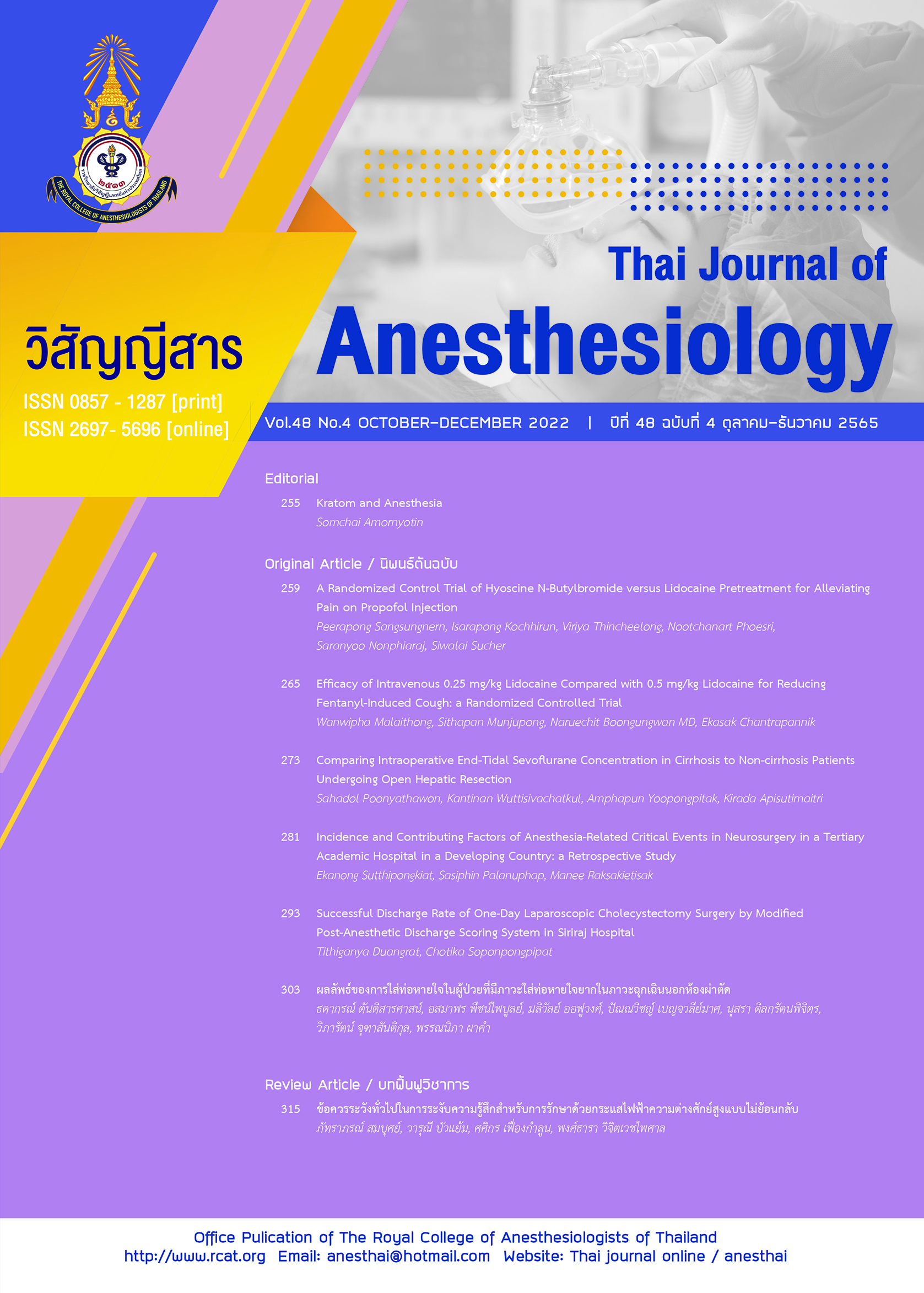Efficacy of Intravenous 0.25 mg/kg Lidocaine Compared with 0.5 mg/kg Lidocaine for Reducing Fentanyl-Induced Cough: a Randomized Controlled Trial
Main Article Content
Abstract
Background: Fentanyl is one of pain medication usually used in anesthetic practice and one common problem after intravenous injection is inducing cough. A 0.5 mg/kg of lidocaine could suppress fentanyl-induced cough, however, the side effect of exceeding doses of lidocaine may cause arrhythmogenic effects and the vasodilatory effects of lidocaine may possibly aggravate cardiovascular depression. Objectives: The study aimed to compare the efficacy of 0.25 mg/kg and 0.5 mg/kg intravenous lidocaine regarding fentanyl-induced cough in general anesthesia. Methods: This study was a randomized double-blinded controlled trial. In all 139 participants, who underwent elective surgery between the ages of 18 to 60 years, were allocated in two groups, to receive lidocaine 0.25 mg/kg and 0.5 mg/kg over two minutes before 1 μg/kg of intravenous fentanyl. Coughing was assessed and classified into 3 grades as mild, moderate, or severe. The risk factors of fentanyl-induced cough and side effects were also noted. Results: Thirteen patients (18.8%) in the 0.25% lidocaine group and eleven patients (15.7%) in the 0.5% lidocaine group experienced fentanyl induced cough. No significant difference was found in the incidence and severity of cough between the two groups (P>0.05). Conclusion: The present findings indicated that pre-operative IV lidocaine 0.25 mg/kg could be considered an alternative dose to suppress fentanyl-induced cough.
Article Details

This work is licensed under a Creative Commons Attribution-NonCommercial-NoDerivatives 4.0 International License.
References
Pandey CK, Raza M, Ranjan R, et al. Intravenous lidocaine 0.5 mg.kg−1 effectively suppresses fentanyl-induced cough. Can J Anaesth. 2005;52:172-5.
Akcaboy ZN, Akcaboy EY, Abdulleyev R, Gogug N. Incidence of fentanyl-induced coughing and effect of injection velocity. Turk J Anaesthesiol Reanim. 2012;40:33-9.
Elcock DH. Fentanyl-induced cough. Anaesthesia. 2010;65:536-7.
Yeh CC, Wu CT, Huh BK, et al. Premedication with intravenous low-dose ketamine suppresses fentanyl-induced cough. J Clin Anesth. 2007;19:53-6.
Sedighinejad A, Nabi BN, Haghighi M, et al. Propofol is effective to depress fentanyl-induced cough during induction of anesthesia. Anesth Pain Med. 2013;2:170-3.
Pandey CK, Raza M, Ranjan R, et al. Intravenous lidocaine suppresses fentanyl-induced coughing: a double-blind, prospective, randomized placebo-controlled study. Anesth Analg. 2004;99:1696-8.
Lin CS, Sun WZ, Chan WH, et al. Intravenous lidocaine ephedrine but not propofol suppress fentanyl-induced cough. Can J Anaesth. 2004;51:654-9.
Tang Q, Qian Y, Zhang Q, Yang J, Wang Z. Effect of different priming doses of propofol on fentanyl-induced cough during anesthesia induction: a preliminary randomized controlled study. Upsala J Med Sci. 2010;115:121-4.
Generali JA, Cada DJ. Lidocaine: cough (fentanyl induced). Hosp Pharm. 2014;49:23-5.
Euasobhon P, Dej-Arkom S, Siriussawakul A, et al. Lidocaine for reducing propofol-induced pain on induction of anaesthesia in adults. Cochrane Database Syst Rev. 2016;2:CD007874.
Ahn EJ, Kang H, Choi GJ, et al. Intravenous lidocaine for effective pain relief after a laparoscopic colectomy: a prospective, randomized,
double-blind, placebo-controlled study. Int Surg. 2015;100:394-401.
Weinberg L, Jang J, Rachbuch C, Tan C, Hu R, McNicol L. The effects of intravenous lignocaine on depth of anaesthesia and intraoperative
haemodynamics during open radical prostatectomy. BMC Res Notes. 2017;10:248.
Dunn LK, Durieux ME. Perioperative use of intravenous lidocaine. Anesthesiology. 2017; 126:729-37.
Elvir-Lazo OL, White PF. The role of multimodal analgesia in pain management after ambulatory surgery. Curr Opin Anaesthesiol. 2010;23:697-703.
Tweed WA, Dakin D. Explosive coughing after bolus fentanyl injection. Anesth Analg. 2001;92:1442-3.
Yemen TA. Small doses of sufentanil will produce violent coughing in young children. Anesthesiology.
;89:271-2.
Gecaj-Gashi A, Nikolova-Todorova Z, Ismaili-Jaha V, Gashi M. Intravenous lidocaine suppresses fentanyl induced cough in children. Cough. 2013;15:9-20.
Uvelin A, Rakic G. Guidelines for prevention of fentanyl induced cough. Acta Anaesthesiol Scand. 2009;53:1228-9.
Kamei J, Nakanishi Y, Asato M, Ikeda H. Fentanyl enhances the excitability of rapidly adapting
receptors to cause cough via the enhancement of histamine release in the airways. Cough. 2013;9:3.
Yardeni IZ, Beilin B, Mayburd E, Levinson Y, Bessler H. The effect of perioperative intravenous lidocaine on postoperative pain and immune function. Anesth Analg. 2009;109:1464-9.
Haldar R, Dubey M, Rastogi A, Singh PK. Intravenous lignocaine to blunt extubation responses: a double-edged sword. Am J Ther. 2016;23:e646-8.
Ayas M, Isik B. Does low dose lidocaine cause convulsions? Turk J Anaesthesiol Reanim. 2014;42:106-8.
Sakabe T, Maekawa T, Ishikawa T, et al. The effects of lidocaine on canine cerebral metabolism and circulation related to the electroencephalogram. Anesthesiology. 1974;40:433-41.
Oshima T, Kasuya Y, Okumura Y, Murakami T, Dohi S. Identification of independent risk factors
for fentanyl-induced cough. Can J Anaesth. 2006;53:753-8.
Ozmen O, Kara D, Karaman EU, Karakoc F, Karakaya MA, Arslan Z. Pheniramine maleate is more effective than lidocaine on fentanyl induced cough. Pak J Med Sci. 2016;32:715-9.
Yakici U, Koltka K, Demircan F, et al. The effect of the intravenous injection rate on the incidence of fentanyl induced cough. Anestezi Dergisi. 2013;21:17-22.
Lui PW, Hsing CH, Chu YC. Terbutaline inhalation suppresses fentanyl-induced coughing. Can J Anaesth.1996;43:1216-9.


